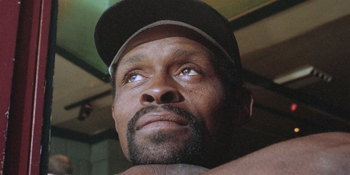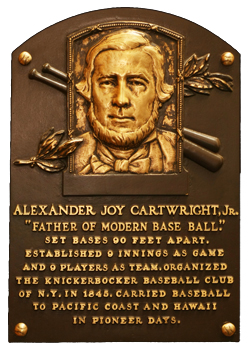5 People History Credits With 'Firsts' (Who Weren't First)

They say history is written by the victors (and rewritten by Victor, who sits on the Texas State Board Of Education and thinks that dinosaurs are a liberal hoax). But then again, how do we know they were the victors? Because they wrote it down? You see the problem. The first guy to sail to the New World, the first guy to perform successful heart surgery, and the first guy to have a 20-inch dick all have something in common: They might be lying. Fortunately, you have Cracked to set the record straight ...
Jason Collins Was Not The First Openly Gay Professional Athlete
When NBA center Jason Collins came out as gay in 2013, it sent rainbow-hued shock waves throughout professional sports. The floodgates of acceptance open, it was just two years after Collins that David Denson followed suit and became "the first openly gay active player on a team affiliated with Major League Baseball." Except Los Angeles Dodgers outfielder Glenn Burke beat them both to the punch by a good 40 years.

According to both scouts and his coaches, Burke possessed the skills to be the next Willie Mays. But those same coaches -- as well as his teammates, and even the press -- simply weren't ready to accept an openly gay athlete in the late '70s. Though Burke was never secretive about it, sportswriters straight-up refused to acknowledge his sexuality, and coach Tommy Lasorda and team VP Al Campanis even went so far as to attempt to buy Burke straight, offering him $75,000 to engage in a phony marriage. Burke refused, and after only two years with the Dodgers, he was traded to the Oakland A's, where manager Billy Martin introduced him to his new teammates by saying, "Oh, by the way, this is Glenn Burke and he's a faggot."
In Oakland, Burke featured in the starting lineup by day and frequented San Francisco's many fine gay establishments by night. Still, neither the media nor the MLB were willing to recognize his sexuality, and in 1980, a highly conflicted Burke walked away from the sport he loved. Two years later, the media finally acknowledged his struggles when Inside Sports magazine published a lengthy tell-all of his experience.

Sadly, it was too little too late, and Burke passed away in 1995, known not as the man who kickstarted tolerance in pro sports, but as the man who invented the high five ... which, wow, is almost better. Damn, dude, leave some revolutionizing for the rest of us.
Ferdinand Magellan Was Not The First Person To Circumnavigate The Globe
Sixteenth-century Europe was heavily dependent on spices, and cloves and black pepper were literally worth their weight in gold. So when Spain's eastern route to the so-called Spice Islands was blocked by a treaty with Portugal, the Spaniards found themselves adrift in a sea of spoiled meat with no hope of savory rescue. Luckily, Spain had Ferdinand Magellan, who, as any elementary school textbook can tell you, "led the first expedition to sail all the way around the world." In 1519, he and his crew set out to find a western route to the Spice Islands, and obviously they succeeded, because you have like six pounds of spices in your cupboard right now and you don't even know what half of them are.

Magellan fell short of finishing the circuit personally, mostly because he went and got himself speared in the leg (and the arm, and the neck, and the face) while attempting to introduce Christ to the lives of locals in the Philippines. To make the previous sentence more historically accurate, replace "Christ" with "his sword" and "lives" with "abdomens."

So wait, Magellan didn't finish the journey as a zombie, so who was really the first to complete a circumnavigation of the globe? Many historians bestow the honor upon Juan Sebastian Elcano, who took command of the Victoria after Magellan's death and arrived back in Spain more than a year later with an impressive 18 of the original 237-man crew. If you're willing to make a couple of well-informed assumptions, however, a more interesting alternative opens up: Magellan's personal slave and the expedition's official C-3PO, Enrique of Malacca.

When the crew refused to free him after Magellan's death, as stipulated in the explorer's will, Enrique plotted with a Filipino king and effected the wholesale slaughter of 30 of the crewmembers at the hands of the king's men. Enrique escaped during the carnage and ... well, historical records of slaves being mostly limited to how much they brought at auction, that's where his official story ends. If, however, he made his way back to his nearby island home -- the starting point of his personal journey and the very place for which it can be reasonably assumed he'd hightail it -- then the first man to circumnavigate the globe was not Magellan, but rather a man Magellan considered "luggage."
Alan Turing Was Not The First To Crack Germany's Enigma Codes
During World War II, deciphering German military communications was a tremendous challenge for the Allies. The messages were comprised of baffling strings of consonants and bizarre, guttural growls -- as if someone had stabbed the very concept of language, and it was now hacking its guts up on the page.
German military communiques were composed with the infamous Enigma machine -- a sort of steampunk typewriter that used an early form of encryption to encode messages into something that could only be decoded by someone with the necessary cipher (plus another Enigma machine).

Thankfully, the British had their own secret weapon: super-genius Alan Turing. As recently immortalized by Benedict Cumberbatch in The Imitation Game, Turing used his sizable smarts to design the even more sizable Bombe machine -- an unholy 6x7-ft conglomeration of gears, rotors, and 12 miles' worth of wiring capable of cranking out the equivalent of 36 Enigma machines. Suddenly, secret German communications were no longer such an ... enigma. It's estimated that the massive code-breaking operation made possible by Turing's machine shortened the war by two to four years.
But Turing was only expanding upon earlier work done by Polish mathematicians. See, while England was busy lining up linguists to try to decipher the German codes, the Polish saw that what they really needed were mathematicians capable of ferreting out patterns. Thus, they put together a team of their best: Henryk Zygalski, Jerzy Rozycki, and Marian Rejewski. Working together, the three developed electro-mechanical computers they nicknamed "bombas" (due to the ticking sound they made while in operation), which simulated the guts of an Enigma machine. Turing would eventually meet with this Polish team when British code-breaking attempts hit a brick wall, and his now-famous "Bombe" was essentially a scaled-up version of the Polish bombas, right down to its name.

So if your grandpa ever asks you how many Polacks it takes to screw in a ligh bulb, you can counter by asking him how many it takes to break sophisticated German encryption and stop WWII. The punchline, of course, is "three." It's ... not a very good joke, but then again, neither was your grandpa's.
Alexander Fleming Did Not Develop Penicillin
In 1928, British bacteriologist Alexander Fleming returned to his lab from vacation to find his Petri dishes full of mold. Upon closer examination, he discovered that the mold inhibited the reproduction of bacteria. He wrote a paper about this curious phenomenon, and 14 years later, the wonder drug penicillin hit the market -- just in the nick of time to save America's dicks!

Even if we ignore the fact that French physician Ernest Duchesne discovered the bacteria-murdering properties of mold when he used Penicillium glaucum to cure typhoid in guinea pigs 32 years before Fleming's discovery, assigning Fleming sole credit for the invention of penicillin is ridiculously short-sighted. After writing up his findings, Fleming pushed his discovery aside and set straight to cleaning up his lab bench. His article received very little attention until a full decade later, when Dr. Howard Florey, a professor of pathology at Oxford, happened upon it in the back issues of an academic journal and began conducting experiments to isolate the active component of the mold Fleming had described -- a process that would keep him busy for the next four years. During this time, Florey enlisted the help of biochemists Ernst Chain and Norman Heatley, and collectively, it was these three men (not to mention their dozens of lab assistants) who were able to isolate and reproduce the antibiotic properties of penicillin.

However, during World War II, the idea of a single man as the savior of innumerable Allied troops made for a much more gripping story in the newsreels. Fleming certainly fit the role, even though his true role was "forgetting to clean up."
Abner Doubleday Did Not Invent Baseball
Each year, more than a quarter-million fans make the pilgrimage to the National Baseball Hall of Fame in tiny Cooperstown, New York -- a place where fewer than 2,000 people live, a good 90 minutes from the nearest airport, and 200 miles from the nearest Major League Baseball field. Why, then, is Cooperstown the uncontested baseball Mecca? Simple: Because that's where, way back in 1839, Civil War hero and Princess Leia haircut inventor Abner Doubleday ...

... scratched some lines in a field and totally invented the game of baseball.
Allegedly.
In 1905, sporting goods magnate Albert Spalding came to the apparent conclusion that, in order to elevate the nascent national pastime to veritable religious status, what it really needed was a creation myth. So he formed a commission with the help of the presidents of the National and American Leagues, and in 1907, they made it official: Abner Doubleday -- a Union general famous for his roles in the defense of Fort Sumter and the Battle of Gettysburg -- was the sole creator of baseball.

But the only verifiable connection between Doubleday and baseball is an 1871 letter he wrote to his superiors, asking them to "purchase baseball implements for the amusement of the men." That's like saying your uncle Frank invented the hamburger because he ordered takeout once.
Actual evidence points to our national pastime finding its roots in England. Handwritten journals and embroideries from a full century before Doubleday's purported invention reference the playing of "base ball" by wealthy socialites across the pond.

If any one man is to be credited with the invention of baseball, it should probably be volunteer fireman and founder of the New York Knickerbockers (not to be confused with today's Knicks, who play with much bigger balls), Alexander Cartwright. He's the guy who, in the mid-1800s, sculpted the game into the time-waster we all know and love today, by introducing rules, such as setting the bases 90 feet apart, having nine players per team, playing nine innings, and all the fans getting totally blitzed by the seventh. And to be fair, Cartwright is in fact honored as the "father of modern base ball" with a fancy golden plaque ... in Cooperstown, New York, the place that convinced countless generations of Americans that Abner Doubleday singlehandedly willed the game into being from a stick and a pile of dirt.

Zach Sands is a former Fulbright scholar with an MA in Film and Literature and a PhD in American Culture Studies, but he still has difficulty opening cereal boxes. Follow him @sands_zach, and he promises to actually use his Twitter account.
It's Spring Break! You know what that means: hot coeds getting loose on the beaches of Cancun and becoming imperiled in all classic beach slasher ways: man-eating shark, school of piranhas, James Franco with dreadlocks. There are so many films about vacations gone wrong, it's a chore to wonder if there's even such a thing as a movie vacation gone right. Amity Island and Camp Crystal Lake are out. So what does that leave? The ship from Wall-E? Hawaii with the Brady Bunch? A road trip with famous curmudgeon Chevy Chase? On this month's live podcast Jack O'Brien and the Cracked staff are joined by some special guest comedians to figure out what would be the best vacation to take in a fictional universe. Tickets are $7 and can be purchased here!
Also check out 6 Famous Firsts You Learned in History Class (Are Total B.S.) and 5 Groundbreaking Firsts That Your History Books Lied About.
Subscribe to our YouTube channel, and check out Why The #1 Fact Of Military History Is A Lie, and other videos you won't see on the site!
Follow us on Facebook, and we'll follow you everywhere.